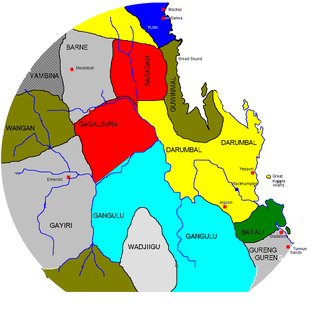
The Warrego River is an intermittent river that is part of the Darling catchment within the Murray–Darling basin, which is located in South West Queensland and in the Orana region of New South Wales, Australia. The Warrego River is the northernmost tributary of the Darling River.

The Gangulu people, also written Kangulu, Kaangooloo, Ghungalu and other variations, are an Aboriginal Australian people from the Mount Morgan area in Queensland, Australia.
The Badjiri people, also written Budjari or Badyidi, are an Australian Aboriginal people of just north of the Paroo River, close to the southern border of Queensland.
The Barungguan are an Aboriginal Australian people of the Cape York Peninsula of Northern Queensland. The name is associated with three languages: Ganganda, Umpithamu and Morrobolam.
The Koamu (Guwamu) were an indigenous Australian people of the state of Queensland.

The Wadjiga people, also known as Wadja, Maudalgo, Wadjainggo, and other variants, were an Aboriginal Australian people of inland eastern Queensland.
The Wadjabangai, otherwise known as Wadjabangayi, were an Aboriginal Australian people of Queensland.
The Wadjalang, also known as the Dharawala, were an indigenous Australian people of Queensland.
The Bidjara people, also spelt Bitjara or Bithara, are an Aboriginal Australian people of south-western Queensland. They spoke a dialect of the Ngura language. They are not to be confused with the Warrego River Pitjara or the Badjiri of the Paroo River, both of whose traditional lands are further to the east of the state.
The Punthamara were an indigenous Australian people of the state of Queensland.
The Ganulu, also spelt Kanolu, are an Aboriginal Australian people of the state of Queensland.
The Wanamara (Wunumara) were an Aboriginal Australian people of the state of Queensland.
The Yilba, also written Ilba and Jilba, are or were an Aboriginal Australian people of the present-day state of Queensland.
The Yangga, also spelt Jangga, are an Aboriginal Australian people of the state of Queensland. They are not to be confused with the Yanga people.
The Yagalingu are an Aboriginal Australian people of the state of Queensland. Their language may have been a dialect of Bidjara.
The Djankun are an Aboriginal Australian people of Far North Queensland.
The Kokomini (Gugumini) are reported to have been an indigenous Australian people of the state of Queensland, though some indications suggest the term may refer to a loose confederation of tribal groups.
The Paaruntyi are an indigenous Australian people of the state of New South Wales. They are not to be confused with the Parrintyi.
Bidjara or Pitjara or Bidyara may refer to:

Paroo County, Queensland is a cadastral division of Queensland and a county of the Warrego Land District of southwestern Queensland.